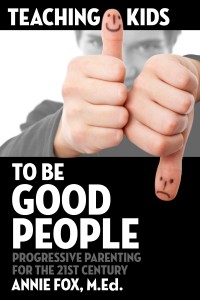As a published author, of course I know about book tours. Not that I’ve ever actually been on one, but I’ve attended other authors’ events at Book Passage. So, yeah. I understand the concept. What I didn’t get, until recently, is “What’s a blog tour?” Turns out it’s pretty much the same thing as a book tour without the books, the bookstore, or the fans eager to buy an autographed copy.
Since I’ve got a new book I’m rather proud of and zero publicity budget, starting today, I’m on the (virtual) road with the Teaching Kids to Be Good People Blog Tour (Feels like we need a theme song. I’ll work on it.) At each of the nineteen stops along the tour, there is no stump speech. You, my dear readers, will be treated to totally new and thought provoking content to help us 21st century parents raise nice kids who also do good in the world.
Here’s where you can find me and when:
Teaching Kids to Be Good People Blog Tour Itinerary
Got the T-shirt:
February 28 – Suzanna Narducci’s blog at TweenParent.com
February 28 – Heather Chauvin’s blog (video interview)
March 5 – Kelly Hirt’s blog My Twice Baked Potato
March 7 – Jean Tracy MSS’ Parenting Skills Blog
March 10 – Jeanne Demer’s The Ruby Books
March 16 – Rick Ackerly’s blog at Genius in Children
March 18 – Margit Crane and Barbara Dab’s Good Enough Parenting Radio Show
March 18 – Sharon Silver ‘s blog at Proactive Parenting
March 19 – Families Magazine Southwest (UK)
March 20 – Sue McNamara at 6seconds.org
March 21 – Kristen Ploetz’ Little Lodestar
March 27 – AK Stout & Deb Evans‘ Social Geek Radio 6 pm (PT)
March 28 – Bruce Sallan’s #DadChat “Doing the right thing is good karma” (on Twitter) 6 PM (PT) Enter TweetChat room
March 29 – Lynnee Jimenez’s ClubChicaCircle.com
April 1 – Melissa Wardy’s blog at PigtailPals
April 8 – Keith Rispin’s Parenting Old School blog as well as Keith’s Ed Tech blog
April 15 – Carrie Goldman’s blog Portrait of an Adoption
April 19 – Sarah Newton’s blog at Sarah Newton.com
April 29 – Dr. Laura Markham’s blog at Aha Parenting
A big thank you to all my blog tour hosts. These are top-notch folks. All of them are authors, educators, clinicians, and/or parent coaches who do truly excellent work supporting kids, parents, and families. I’m honored to be on the same team with each of them and I encourage you to explore their books and services. We’re all here together to help each other as we help our kids.
OK, the blog tour starts now. Wait!! How’s my hair look? Oh, right. It doesn’t matter. :O))
Happy Parenting! (And if you feel the urge, please sign the guest book.)















